Best eCommerce Platforms: Top Solutions for Online Stores
In today’s digital era, having an online store is essential for businesses of all sizes. Whether you’re a small business owner, an entrepreneur, or a large enterprise, choosing the best eCommerce platform can make a significant difference in your success. With so many options available, selecting the right online store builder can be overwhelming.
An eCommerce platform is a software solution that allows businesses to create, manage, and operate an online store. From handling product listings, shopping carts, and secure payment processing to offering advanced features like SEO optimization, mobile responsiveness, and third-party integrations, these platforms provide all the essential tools to run a successful online business.
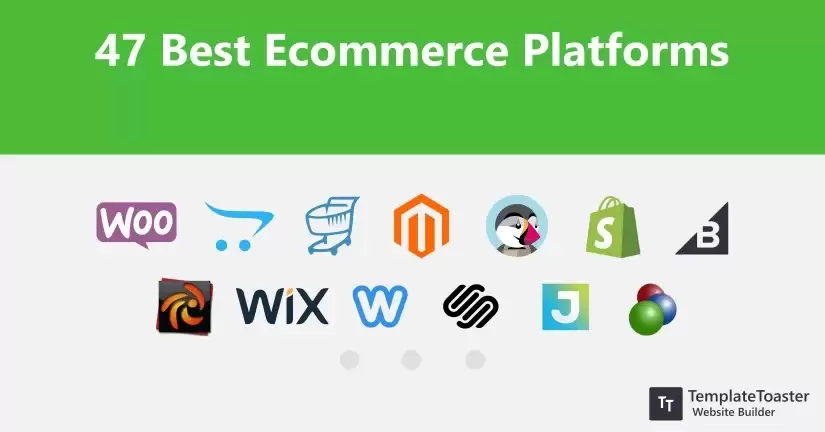
When selecting the best eCommerce software, several factors come into play, including ease of use, customization options, pricing, scalability, security, and marketing tools. Some platforms cater to beginners with simple drag-and-drop builders, while others offer robust solutions for enterprises needing advanced customization and performance. If you’re looking for an all-in-one solution to build and manage your online store effortlessly, an eCommerce Website Builder can be a great option.
In this article, we’ll explore the top eCommerce platforms available today, comparing their features, pros & cons, pricing, and best use cases. Whether you’re looking for the best platform for small businesses, dropshipping, or enterprise-level operations, this guide will help you make an informed decision.
Big Contenders/Top-Players of eCommerce Platforms
Of course, there are some leaders in the space, but not the best eCommerce platform. Because it depends on your needs that which platform will work best for you. So, here in this blog I have prepared a list of big contenders suggested by the eCommerce community itself.
Top eCommerce Platforms Comparison Table
| Platform | Pricing | Key Features | Best For |
|---|---|---|---|
| Shopify | Basic: $39/month Shopify: $105/month Advanced: $399/month | – User-friendly interface – Extensive app store – 24/7 customer support – Built-in SEO features | Small to medium-sized businesses |
| WooCommerce | Free plugin (Additional costs for hosting, themes, and extensions) | – Highly customizable – Large community – Seamless integration with WordPress | Businesses with WordPress experience |
| BigCommerce | Standard: $39/month Plus: $105/month Pro: $399/month | – No transaction fees – Multi-channel selling – Robust SEO tools | Growing businesses and enterprises |
| Magento (Adobe Commerce) | Open Source: Free Commerce: Custom pricing | – Highly scalable – Advanced features – Suitable for large catalogs | Large enterprises with development resources |
| Wix eCommerce | Business Basic: $25/month Business Unlimited: $35/month Business VIP: $45/month | – Drag-and-drop builder – Hundreds of templates – Integrated marketing tools | Small businesses and beginners |
| Squarespace Commerce | Business: $33/month Basic Commerce: $36/month Advanced Commerce: $65/month | – Award-winning designs – Built-in blogging platform – Comprehensive eCommerce features | Creatives and small businesses |
| OpenCart | Free (Additional costs for hosting and extensions) | – Open-source platform – Multi-store functionality – Extensive marketplace for extensions | Developers and tech-savvy users |
| PrestaShop | Free (Additional costs for hosting and modules) | – Open-source and customizable – Strong community support – Multilingual and multi-currency support | Medium to large businesses |
| Ecwid | Free plan available Venture: $15/month Business: $35/month Unlimited: $99/month | – Easily add store to any website – Supports multiple sales channels – Mobile responsive design | Small businesses and startups |
| Salesforce Commerce Cloud | Custom pricing | – AI-powered personalization – Omnichannel capabilities – Scalability for large enterprises | Large enterprises |
1. Shopify
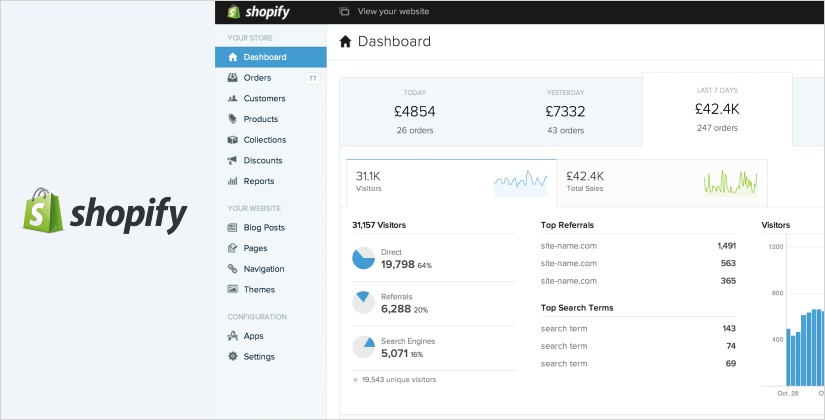
Shopify is a Canadian-based eCommerce platform. It is indeed a great choice to open an online store for small-scale businesses. It serves a plethora of themes, plugins, and extensions for convenient mobile shopping. A service to lower the transaction fee i.e. point-of-sale (POS) system to process sales is also included. But, it depends on the plan you opt for. Since, it provides technical support via live chat, phone and tutorials as well. Hence, building a full-featured online store with built-in payment processing is a breeze.
Advantages
- Comprehensive sales tax tools.
- Wide range of themes.
- Huge selection of plugins to choose from.
- Unlimited products in all plans.
- Substantial marketplace for integration.
- Different payment integration.
Drawbacks
- Additional transaction fee if not using Shopify Payment.
- Extra investment for useful extensions.
2. Squarespace Commerce
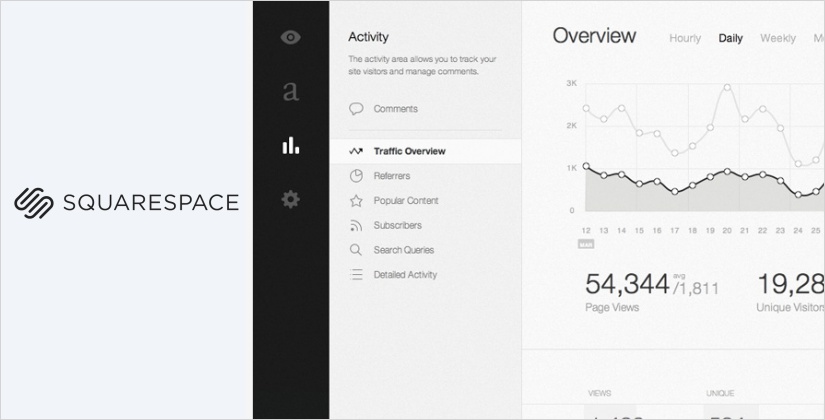
Squarespace is a cloud-hosted website builder. It offers an eCommerce platform to build your own online store with ease. It renders site themes and tools not only to build a blog or landing page but also to sell your products online. However, there is no transaction fee for online store plans and also avails a free domain with annual plans. To ensure security SSL security is also there. Moreover, integrated Xero accounting, label printing, and an array of metrics also help you. Squarespace possesses top-class features to build a customized eCommerce website.
Benefits
- Easy to use.
- High rated templates.
- Sell items on Facebook and Instagram.
- Wide range pf themes and plugins.
- Unlimited products in all plans.
- Payment options integration.
Pitfalls
- A transaction fee is charged for sales on business plans.
- Finite add-ons.
3. Wix eCommerce
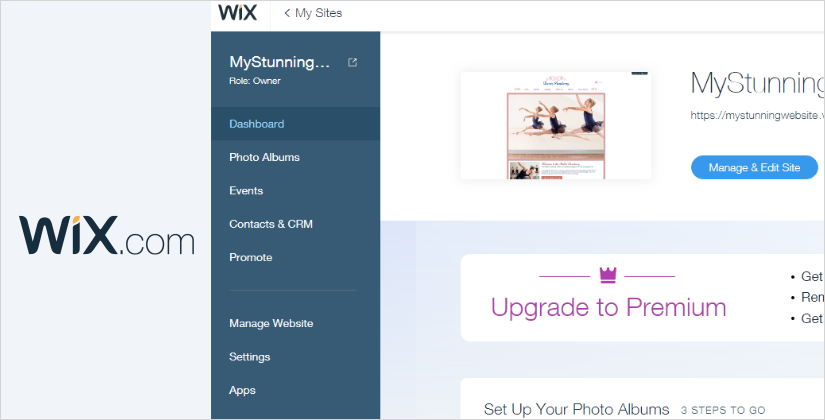
Wix is a cloud-based development eCommerce platform to build a custom web store. It offers hundreds of templates to choose from. You can create a mobile-optimized website in a drag & drop environment. Wix has beautiful product galleries, different payment solutions, secure checkout, and much more. It powers you with global tax and shipping methods, coupons and discounts. And also creates backup points that can be restored anytime. Wix provides you a 24×7 support, thereupon adding any feature to the website gets simpler.
Major Benefits
- Top-notch design functionality and SEO tools.
- Free domain included.
- Wide range of themes to choose from.
- Unlimited products in all plans.
- Payment options available.
Stumbling Blocks
- Blogging platform can be better
- You need to pay for professional features.
- You can’t switch a template after you select one and start working on it.
- Difficult to add custom functions if not provided with the app.
4. Weebly eCommerce
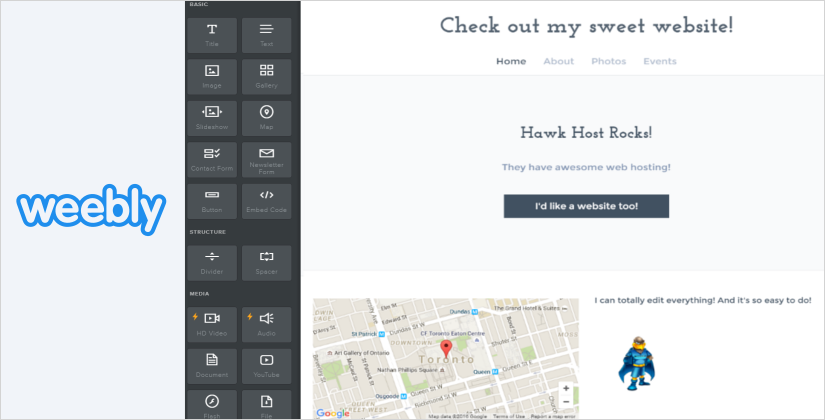
Weebly is a website builder that gives a fully functional ecommerce platform. It lets you create an online store that works in the way you want it to. Above all, it has an easy-to-use drag & drop interface to build a standalone website, blog, or e-store. It automatically adds the pages corresponding to the items you add to your website. Weebly calculates tax and shipping rates for orders, sends branded store emails. Even so, you are free to structure your products into categories on your site pages. Above all, it provides great flexibility and saves a lot of time and effort.
Pros
- Easy-to-use and beginner-friendly.
- Mobile-responsive themes.
- Powerful SEO toolset.
- Integration of booking system.
- Affordable eCommerce platform.
Flaws
- There is no customer login function in case of repetitive shopping.
- Limited design options.
- Choice of two editors is confusing.
5. BigCommerce

BigCommerce is one of the best eCommerce platforms. In case you’re already having a store then it can help you add your existing product listing to your new store. It integrates with Facebook, eBay, Google Shopping, and many other social sites. Thus, while setting up your own store, you can import product lists from any such site. BigCommerce makes it easy to maintain the inventory at the selling marketplaces. The responsive themes, POS interface, and shipping options can boost huge traffic. Go through the setup wizard, detailed guides, visual illustrations to learn the installation. BigCommerce is unquestionably the best solution to sell your products at different stores.
Best Part
- Built-in visual merchandizing tool.
- No transaction fees.
- Top-notch product management.
- Product rating and review options.
- Wide array of free applications to choose from.
- Great for selling across multiple channels.
Glitches
- Limited export log features.
- Lack of free themes.
- Inflexible shipping options.
6. WooCommerce – Free eCommerce Platform
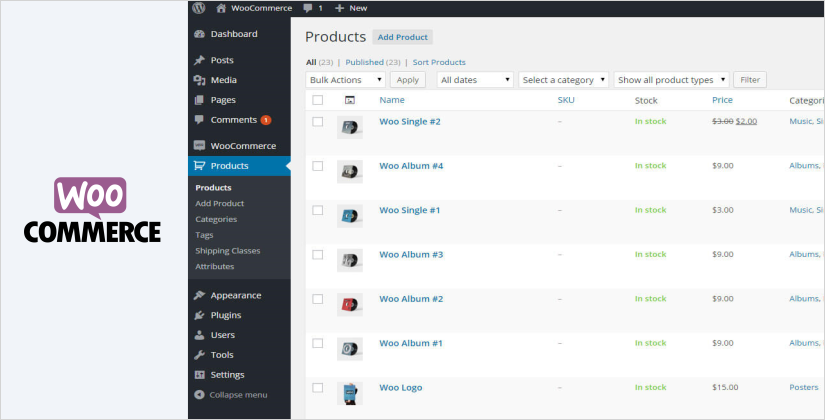
WooCommerce is a free WordPress plugin, launched in 2011. This customizable ecommerce platform comes with secure payment gateways and shopping cart options. It has the ability to turn any WordPress website into an eCommerce store. However, you can add unlimited product categories, inventory management, and coupons to your site. Super easy to manage admin panel. You only need to add content and the rest WooCommerce will do for you. Whereas, it involves some investment to get hosting, domain name, extra extensions & themes. That means everything is super easy and you can easily drive traffic to your website.
Advantages
- Open-source, unlimited customization, and developer-friendly.
- Unlimited products and orders.
- Features-rich free eCommerce platform.
- Wide array of themes and customization options.
Drawbacks
- Above all, poor media manager for handling images.
- Additional investment for integrating shopping cart.
- Lack of scalability with business growth.
7. PrestaShop

PrestaShop is a beautiful open-source eCommerce platform. It is easy to use and doesn’t need any experience to install. It supports more than 65 languages. Also include core qualities like search pages, email marketing, detailed analytics, and so on. Likewise, provide a wonderful inventory management system and adaptable store maintenance. Furthermore, it has many modules and themes to build a responsive store. It configures various shipping methods and coupons for you. PrestaShop also provides multi-vendor and multi-currency support. You can have a free cloud or self-hosted store to sell the products online.
Benefits
- Easy to use.
- Mobile-responsive web design templates.
- Great amount of third-party integration available.
- It works as cloud-based or locally installed solution.
Pitfalls
- Lesser scalability as compared to Magento or other major ecommerce platforms.
- You probably have to pay more for nice themes and other extra modules.
- Premium training is comparatively expensive.
8. OpenCart

OpenCart is a lightweight and easy-to-use open-source eCommerce platform. It provides you a feature-rich, search engine-friendly, and appealing interface. It supports over 20 different payment methods along with 8 shipping methods. However, the order processing functionality in OpenCart is highly appreciable. It gives great backup, restores tools, and automatically resizes the images. It gives multi-language, multi-currency, and multi-payment gateway support. Thus, OpenCart is the best suitable option for basic websites as well as easily developed tasks. Furthermore, it includes lifelong free software updates.
Advantages
- Free eCommerce platform.
- Various customization options and third-party modules.
- Customization available.
- Fast and easy to set up and configure new shopping website.
Disadvantages
- Relies on extra plugins for good performance.
- Not SEO-ready by default.
- Customization options are a few.
9. VirtueMart

VirtueMart is a free eCommerce platform coupled with the Joomla CMS. Certainly, it is the best shopping cart solution that comes with a range of templates and layouts per category. There are various payment and shipping options to make this platform more desirable. However, the powerful SEO features can promote your store well. Whereas, the rating and review system enhances the customer experience. Certainly, all the features make it the best option for small or medium-size retailers. And the brands like Produtti Herbalife, DP Moda, 3D Puzzle Welt are using it.
Success
- Unlimited product, categories, and customers.
- Flexible pricing plans.
- Coupon and discount options.
- SEO features are available.
- Various checkout options
Setback
- Extra expenses for hosting.
- Accepting payments via VirtueMart is a little costlier in comparison with other platforms.
10. Magento
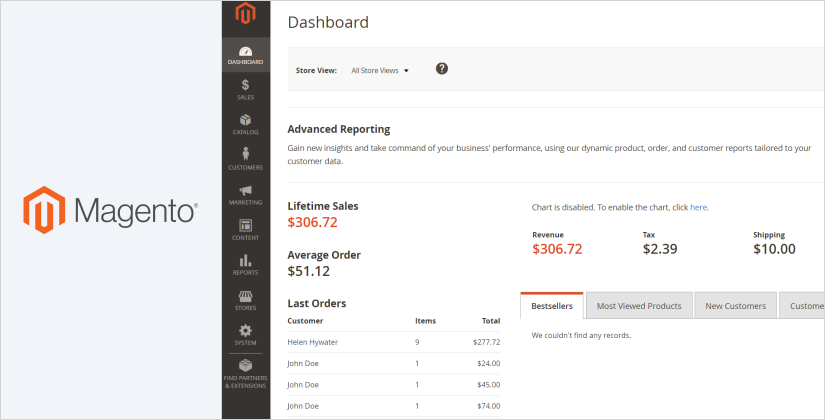
Magento is a popular open-source ecommerce platform. It provides unlimited customization options to run a store on your own server. And let you have complete control over the store. It is easy to manage with the core product pages, order management tools, and scheduling tools. You are free to add the blog to your store via plugins. Similarly, you will get free social media extensions to create barcodes, and make price comparisons. Its extensive resource library for demos helps you to build a store with the features you need. This is why many leading brands like Burger King, Huawei, Pepe Jeans, etc. have trust in this platform.
High Points
- Open-source offers complete customization options.
- Flexibility to easily customize the platform.
- Great for global sites.
- Adaptable Magento marketplace.
- Massive community of developers
Low Points
- Technical skills needed to set up and customize your store.
- Requires money and time for optimization.
Useful eCommerce Platforms/Software
No doubt, the increased market demands raised the number of emerging eCommerce platforms. In fact, a study shows that 78% of shoppers use the internet to buy or research future purchases every year. According to statistics, among US people the trend of online shopping is so popular. That’s the reason there are many eCommerce shareware to provide you solutions for the same. So, here is the list of existing eCommerce platforms that can fulfill your needs. Let’s have a look.
11. Gumroad

Gumroad is an ecommerce platform that lets you sell digital products directly to consumers. However, if you add more than one product it will automatically convert into a store. It puts a PDF stamping to protect digital products from piracy. It’s simple to share and sell products on social media, blogs, or email with custom product links. In fact, keeping track of sales and tracing audience growth is very simple here. Moreover, the referrals come up with clear graphs in Gumroad. And sending email updates to customers from the dashboard only is also achievable. Also, it helps you to grow your audience through a landing page. It provides tools for artists, writers, & musicians to sell products to their followers.
12. Big Cartel
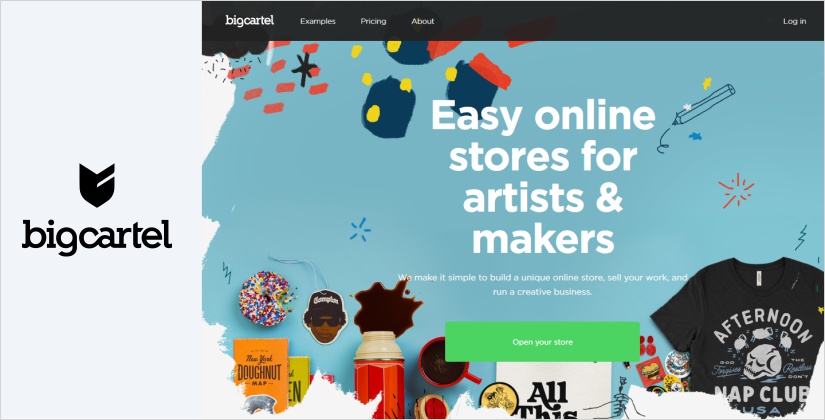
Big Cartel ecommerce solution is basically for makers, creative people. It lets you create a magnificent appearance for your store. Social media integrations like Facebook and Google Analytics enhance your reach. Whereas, order management, inventory tracking, and discount codes boost easy handling. And certainly, all these will help you build a strong online store with ease.
13. Ecwid
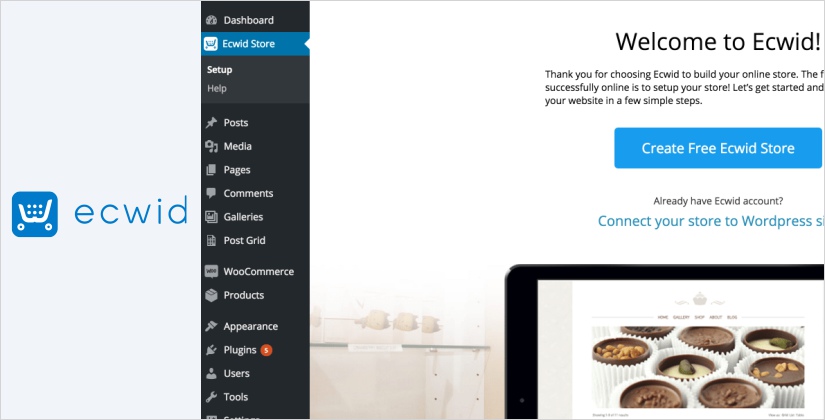
Ecwid is a cloud-based eCommerce platform. It helps you move to another website through widgets. No installation required. Adding your store to various sites, blogs or social networks is very simple. All the storefronts can be managed with a single control panel. Moreover, the responsive design makes your store fit for every screen size. It’s simple to sell on mobile phones, social sites, Google Shopping, Amazon, and Shopping.com. It also facilitates its customers to maintain an account for faster transactions. No setup or transaction fee charged. You can customize your store design & put promotional pricing, discount coupons, volume discounts. There are more than 40 payment options to choose from. Withal, you can work with offline POS systems as well. It is a good starting solution for eCommerce Industry.
- Not a standalone e-commerce solution.
- Live Chat and Phone Support available only under premium plans.
14. Ubercart
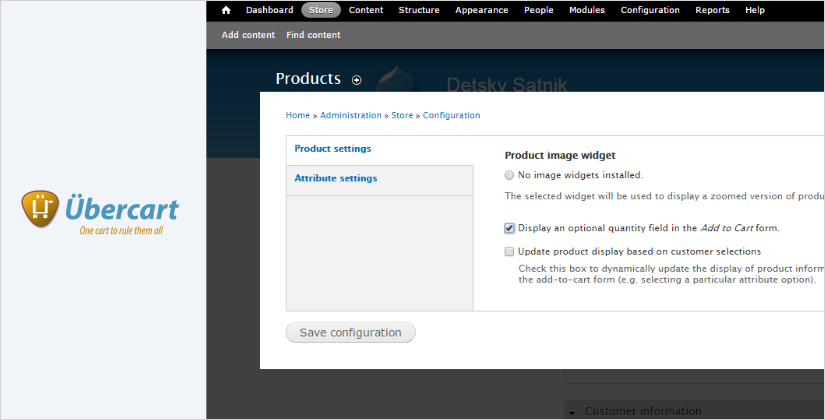
Ubercart is a simple Drupal open-source eCommerce platform. It is easy to set up and comes coupled with a payment module and shipping options. It offers a customizable order processing page. In fact, activity logging lets you find an order’s status at any point during the purchase process. Similarly, the import/export of information from an old store to the new one is really smooth. You will get updates regularly. Thus, Ubercart works well for small stores, whereas extension is also possible.
- It is probably more suitable for small businesses.
- Specifically, the customization controls are less powerful.
15. Shopware
Another powerful e-commerce platform to create appealing online shops of any size. It is a free and open-source solution. The kind of features you get here will let you create a unique store with a strong reach. And of course, Catalog Management and Channel Management can help you serve better. Whereas, Email Marketing, Inventory Management, Loyalty programs, and Multi-Store Management are also there. Thus, creating a fully functional online store with Shopware gets easy.
16. nopCommerce
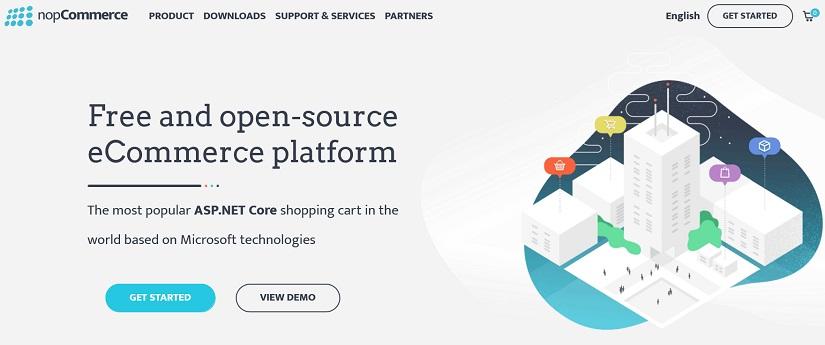
It is a free & open-source e-commerce solution to sell physical as well as digital goods. No matter which size business you run, be it a corporate or small business, nopCommerce has a lot to offer you. It is a transparent and well-structured solution based on ASP.net. It has all the required e-commerce features with multi-vendor and multi-store support. nopCommerce is the best option as compared to other available in the market.
17. Shift4Shop
Shift4Shop is a feature-rich eCommerce platform to build a stunning online store. Basically, it is a hosted solution to build a full-fledged online store from beginning to end. Hundreds of easy-to-use customizable designs are available. All the designs are mobile optimized. Also, supports unlimited product categories, waiting lists, tax handling, and so on. A store driven by 3dcart is by default SEO-friendly with upsells and cross-sells. No transaction fee involved and amazing 24×7 customer support.
- Limited free templates usually with a bland look.
- Inconsistent customer support.
18. Volusion
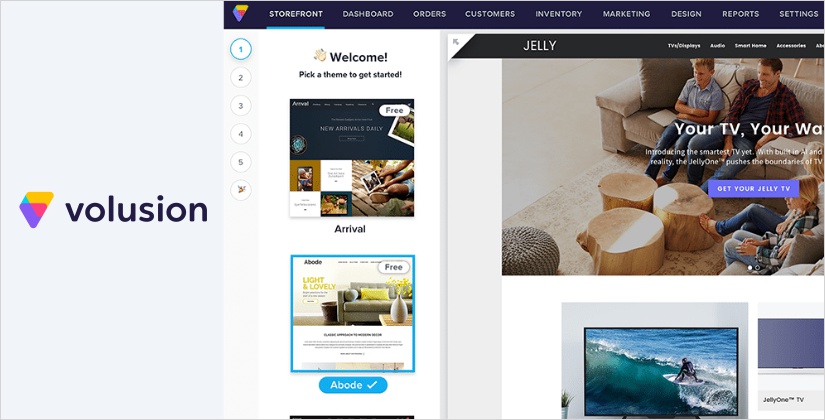
Volusion is an effective eCommerce platform to promote your products online. It has unlimited product options to add to the respective product categories. The inbuilt SEO tools help show your products with a detailed listing. However, it automatically calculates the shipping and tax rates. Creating and managing discounts and newsletters is pretty simple with Volusion. It has a social management system that allows you to list your products on eBay, Amazon, and a Facebook Store. You don’t have to pay any transaction fee for posting your reviews.
- Only a few free themes are available.
- All plans have bandwidth limitations.
- Volusion payments are not available to merchants outside the United States.
19. EKM
It is a quick & effective ecommerce platform for establishing an online outlet. Hence, EKM allocates a dedicated account manager to every store. In addition, you receive a free domain name and over 200 templates to choose from. You don’t need manual setups for receiving payments.
20. Sylius
Sylius is a free e-commerce platform simple to integrates with existing systems. Indeed guarantees the fast time to market. Features like exceptional flexibility, code quality, extendability make it more enticing. Indeed, a simple platform to work with. Few complexities while working with Sylius.
21. UltraCart
Ultracart eCommerce platform manages your business well. It’s easy to manage your online business with UltraCart. Because it offers auto orders, shipping, fraud review, payment processing & marketing management. Moreover, its default integration with many payment gateways ensures secure transactions.
22. CloudCart
CloudCart allows you to create a web store as well as provide you with hosting from Google cloud. No technical skills required to start selling online. One of the best ecommerce solutions that include customer intelligence for e-commerce business. Overall, an easy call for amateurs.
23. X-Cart – Free eCommerce Platform
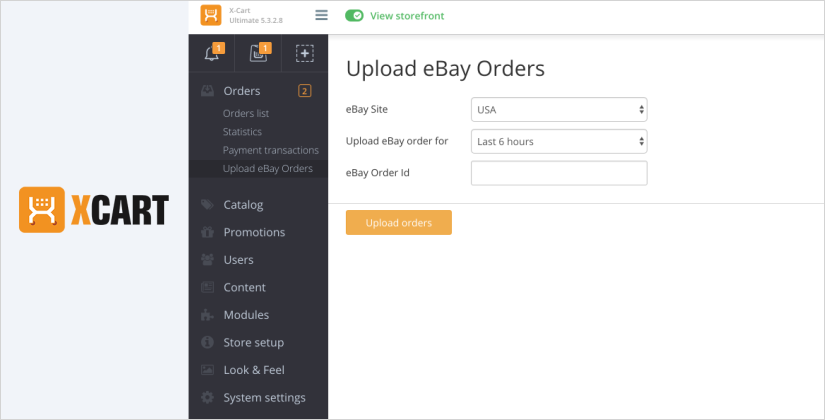
X-Cart is a free and self-hosted eCommerce platform. This platform is easy to use and set up. And offers mobile responsive designs to use along with third-party application integrations. However, the basic edition is free but you have to pay one time for business licensing. No extra monthly charges as well as no payment for transactions. You are anyhow just a click away from the upgrade. X-Cart is popular for its key features like multi-language & multi-currency support. However, the payment gateway integration, PCI compliance, and security are some significant inclusions. options to use. Well, all these features certainly make it the best self-hosted eCommerce store.
- Extra fee for direct customer support.
- Some manual coding might require while setting up a new store. Thus, it requires some technical skills.
24. OsCommerce
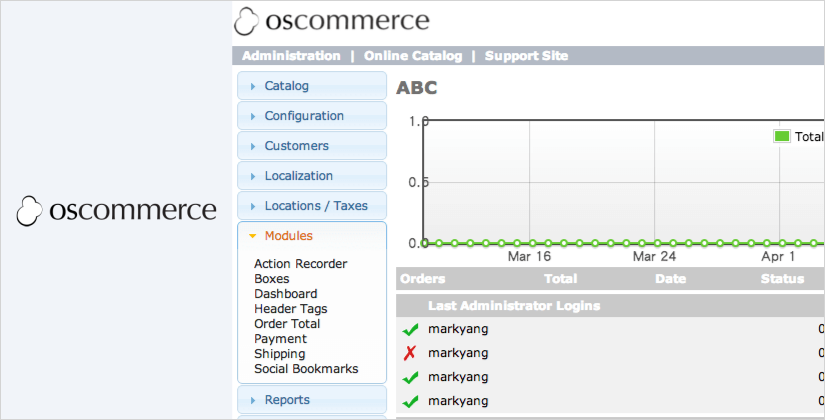
OsCommerce is an open-source eCommerce platform to build a self-hosted online store. It is easy to set up with more than 7000 add-ons. And it doesn’t ask for experience to do customizations. The destination-based shipping modules and advanced search features make it simpler to work with. Currently, brands like Ubuntu Shop, Persico, Melbourne Kitchen Renovations are using OsCommerce.
- Requires more maintenance and extra expenses on SEO.
- Less scalable than other competing ecommerce platforms.
- Since it is prone to errors, therefore, you need an expert to protect a site.
25. Drupal Commerce
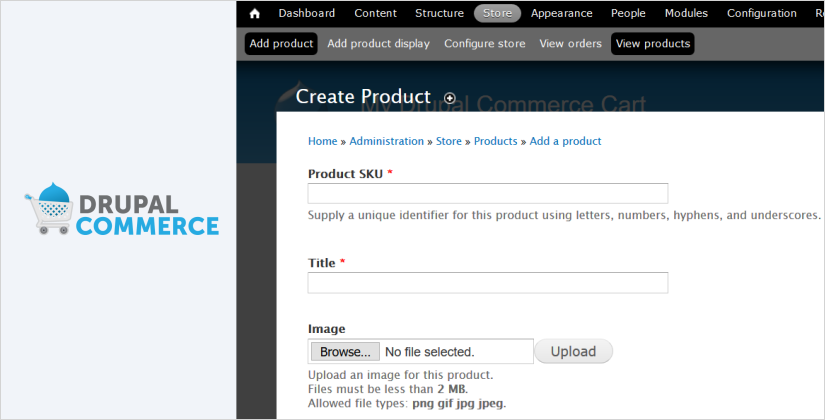
Drupal Commerce is one of the most comprehensive open-source eCommerce platforms. A considerable percentage of the internet is powered by Drupal. It gives the flexibility to integrate a rich commerce experience. Additionally, it connects content and products seamlessly to scale up the user experience. Optimized merchandising tools and SEO tools provide an optimized website. The built-in security system that frequently updates, keeps your website secure. Thus, you experience great speed and performance with built-in caching. It supports a huge community to help you with your issues. Open Sesame, Lush Cosmetics, and many such big brands are already using it.
- A tough learning curve is associated with it.
- It seems you have to pay some extra cost for host servers.
26. ZenCart – Free eCommerce Platform
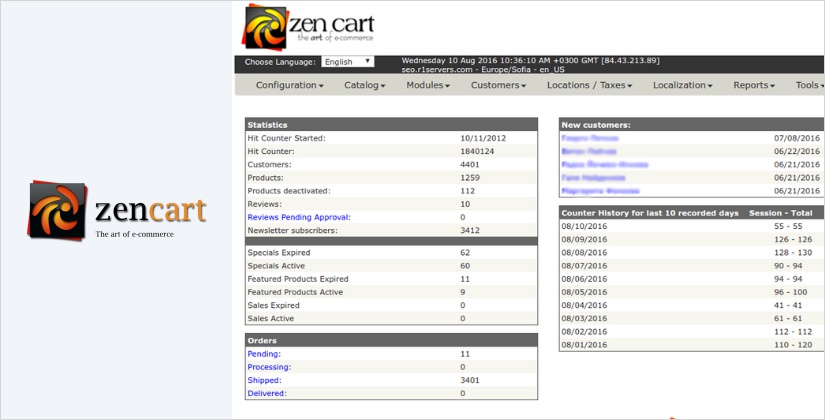
ZenCart is a PHP/MySQL-based open-source shopping cart with powerful features. It is pretty useful for retailers and non-technical users. It provides hundreds of custom options, downloadable add-ons, and payment gateways. Likewise, the reporting function helps in tracking product performance. It enables you to show advertisements and banners for associated products. You can also manage discounts, group pricing, coupons, and voucher codes with ease. It offers plenty of themes and multi-language support. And this indeed is a secure and user-friendly eCommerce platform to scale up your business.
- No dedicated support.
- Less impressive templates.
- Needs customization for a modern-looking cart.
27. Spree Commerce
Spree Commerce is an open-source shopping cart for building e-commerce websites. It is fast, flexible, and fully customizable. Spree Commerce incorporates many enticing features, for example, Modular architecture, Responsive Site Design. Product Configuration, Customer Subscriptions, Comprehensive API, Robust Open Source Community are also there. And they help in designing a beautiful store. On the whole, it makes a complete package for designing a website.
28. Yo!Kart
Yo!Kart is a multi-vendor eCommerce platform to start your own online marketplace. It integrates with MailChimp and PayPal for secure transactions. These reporting tools coupled with SEO features ensure a successful online business.
29. Getsocio
Another great solution developed by Anadea for building professional daily deal websites. Getsocio incorporates distinct features chiefly customization options, built-in email marketing tools. Also, shopping cart, mobile apps, affiliate & referral programs, payment methods & social media integration. And this collaboration of features certainly delivers a great-looking and working website.
30. AirSquare
This is an all-in-one eCommerce solution to create a new website or move an existing site to your platform. You can test all the functionalities during the trial version. And once you are satisfied with the services of AirSquare you are free to choose a paid plan as per your needs. A superb solution with a variety of attributes.
31. Able-commerce
Able-commerce is a full-fledged shopping cart ecommerce platform. This platform is PA-DSS 3.1 certified by the Visa/MC payments. It coupled with bootstrap responsive design and integrated with payment gateways. Able-commerce is a highly customizable & SEO-friendly platform. Able-commerce is coupled with advanced security features. Furthermore, aids you with the option to switch to any other ecommerce platform.
32. eComChain
eComChain is a cloud-based ecommerce platform to build an online shop. It gives you an enhanced customer experience. You’ll find hundreds of templates and integrations to various 3rd party services. It is easy to maintain, low cost, a user-friendly ecommerce platform that certainly worth a try.
Which eCommerce Platform You Should Use?
Choosing the best eCommerce platform depends on your business needs, budget, and technical expertise. If you’re looking for an easy-to-use eCommerce website builder, platforms like Shopify and Wix eCommerce offer intuitive drag-and-drop solutions. For businesses that prefer flexibility and full control, WooCommerce and Magento (Adobe Commerce) provide powerful customization options. Meanwhile, BigCommerce and Squarespace Commerce strike a balance between functionality and ease of use.
Ultimately, the right eCommerce solution will empower you to create a seamless shopping experience, improve conversions, and scale your online business effectively. Evaluate your specific requirements, compare pricing, and explore available features before making a decision. No matter which platform you choose, having the right tools in place will set your online store up for long-term success.
Build a Stunning Website in Minutes with TemplateToaster Website Builder
Create Your Own Website Now
Whoa! It was such a detailed post. Very informative and useful. Tons of thank for sharing with us. Keep posting.
Nice Post.
Nice, How much time you invest to sort out these 200 ecommerce platform. wow.
In my opinion Woocommerce and Magento is the best one.
I also read about which platform top dropshipping website are using.
read it here: best ecommerce platform – cloudways.
Please add Shopsys – a scalable ecommerce platform based on PHP and Symfony. Thanks!
I would personally suggest Multi vendor marketplace platform- Powerful ecommerce platform based on PHP laravel framework. Thanks!
Nice and very useful article but one thing is there that i wanna point out is you forgot to mention Bazarbit. This powerful ecommerce platform is designed at its best to deliver a best output to its customers.
Thanks for featuring Spree Commerce. We have some interesting case studies of brands using this open source software for their ecommerce platforms under our stories section.
Shopify is the best and trending e-commerce platform. It has many interactive themes and also you can promote your product through this.
Have you tried ShopFunnels? It is also a budget-friendly e-commerce builder with features like drag-and-drop design, inbuilt hosting, A/B testing, inventory management, profit-boosting plugins, and many more. Do check this out as well!
I love Shopify eCommerce Platform.
I prefer WooCommerce for low budget self hosted websites and Shopify for paid.